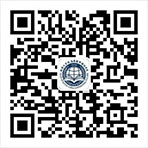
The 36th session of “Tongji Serial Lectures on Social Sciences” was successfully held by the Institute for China & World Studies and the School of Political Science & International Relations, Tongji University in Conference Room 1802, Zhonghe Building, Tongji University on April 22, 2021. Professor Yang Guangbin from the School of International Studies, Renmin University of China, was specially invited to deliver a keynote speech themed “World Politics Studies, International Relations (Comparative Politics), and World Political Science”. The lecture was moderated by Professor Men Honghua, President of the Institute for China & World Studies and Dean of the School of Political Science & International Relations, Tongji University. Professor Song Wei, Director of the Department of International Politics, the School of International Studies, Renmin University of China, attended the lecture as a guest. Nearly 50 teachers, doctoral students and master students from the School of Political Science & International Relations of Tongji University listened to the lecture.
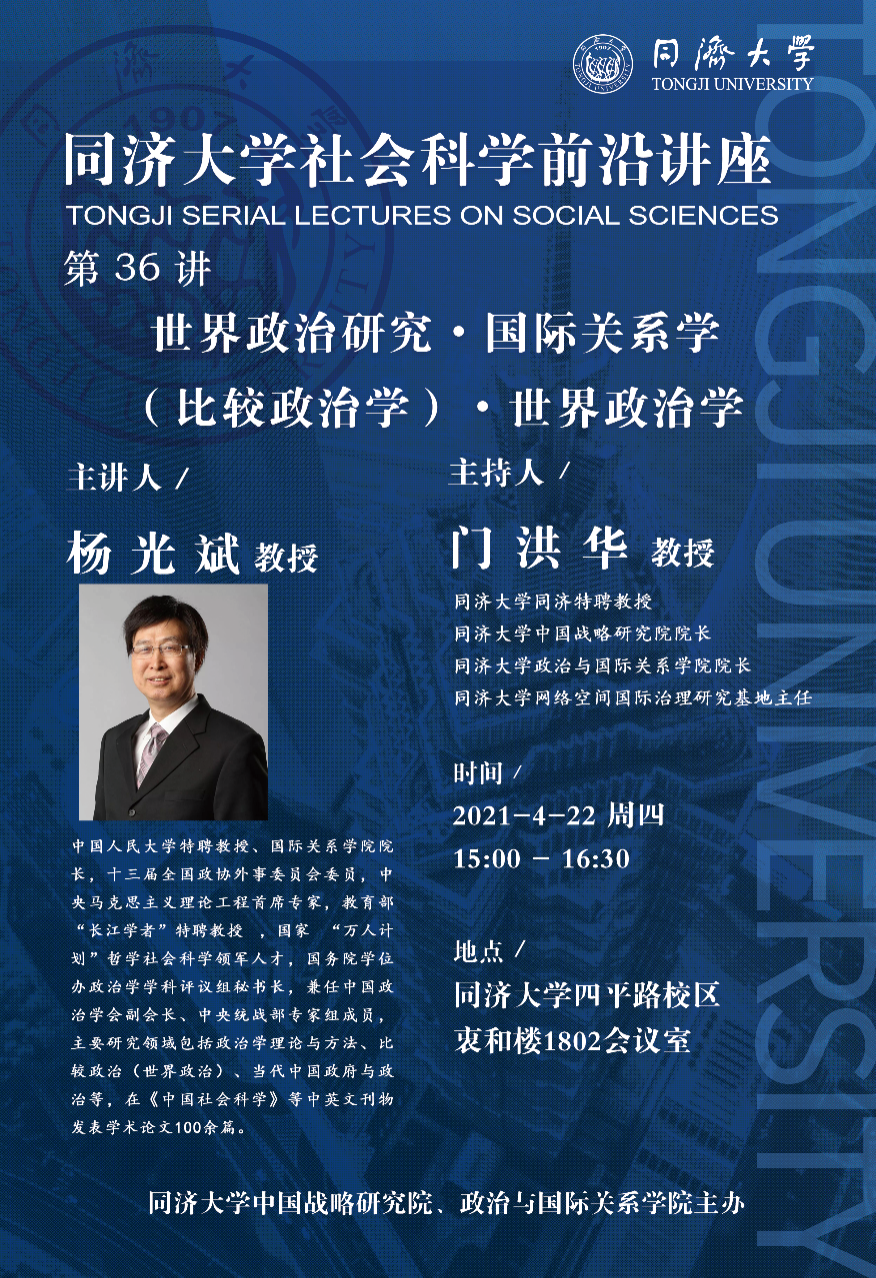
Professor Yang is Dean of the School of International Studies, Renmin University of China, a member of the Foreign Affairs Committee of the 13th CPPCC National Committee, a chief expert in the Central Marxist Theory Research and Construction Project, a distinguished professor under the Changjiang Scholar Program of MOE, and a leading talent in Philosophy and Social Sciences of the National “Ten Thousand Talents Program”. His research interests include theory and methodology of political science, comparative politics (world politics), contemporary Chinese government and politics, China’s domestic political economy and foreign relations. Professor Yang has written and published a great number of works, and many of his research findings have produced significant theoretical and practical influence.
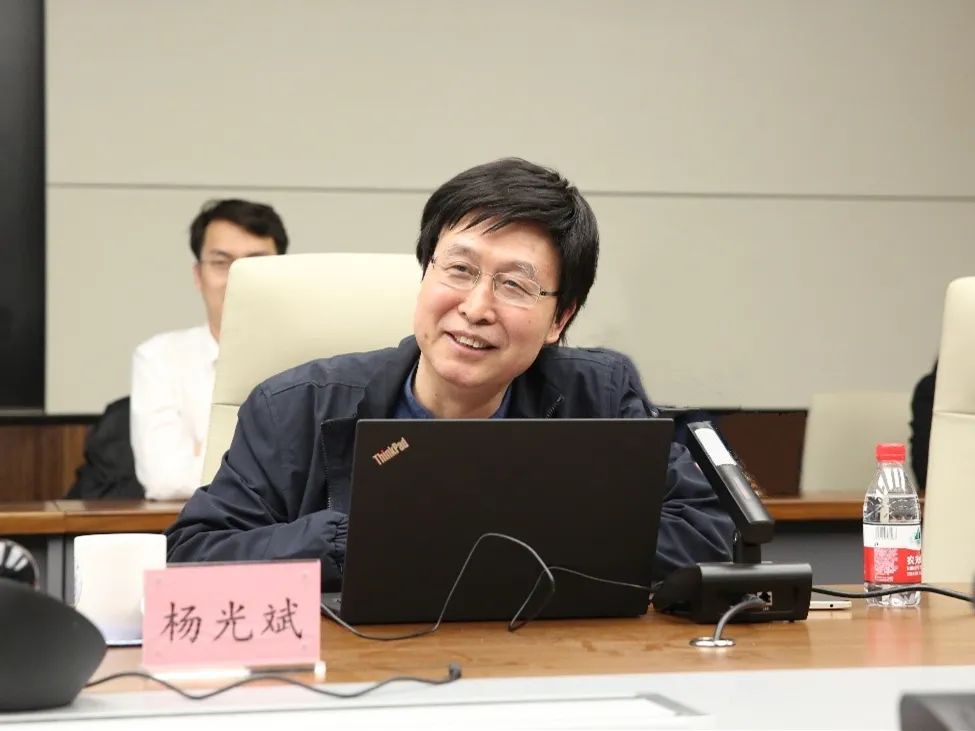
In this lecture, Professor Yang gave a detailed explanation on relevant issues in world politics studies from four dimensions: the tradition and discipline construction in the world politics studies in China, the great changes of the world politics studies since the 1980s, the retrieval of the tradition and disciplinary upgrading of the world politics studies, and the Chinese view of world order.
Firstly, Professor Yang reviewed the tradition and discipline construction process of world politics studies in China. He pointed out that from the perspective of origin, the Communist Party of China (CPC) was born at a time of great changes in the world and was a product of world politics. According to his further analysis, the 2nd CPC National Congress was deeply influenced by the 2nd National Congress of the Communist International which probed into the Eastern issues in 1920; to echo the resolution at the 2nd National Congress of the Communist International, the CPC put forward the new goal of “anti-imperialism and anti-feudalism” based on the goal of “eliminating civil strife, overthrowing warlords, and advancing domestic revolution” raised at the 1st CPC National Congress, which was a milestone in the development of the CPC and marked that the CPC began to position itself as a political party in world politics. Later, the CPC opened up the course of World Politics in Yan’an Anti-Japanese Military and Political College, and Mao Zedong published “On the Protracted War”, a classic article on world politics.
According to Professor Yang, the CPC has always had a tradition of world politics throughout its development course. In terms of the development process of China’s discipline establishment of world politics, the focus in the 1960s was on regional studies, and universities including Peking University, Fudan University, and Renmin University of China undertook the tasks for different regional studies. In the 1980s, Deng Xiaoping proposed to restore social sciences including political science and called for enhancing world politics studies, saying that “peace and development are the theme of the times”, a significant conclusion about world politics.
Secondly, Professor Yang introduced the transformation of China’s world politics studies from problem-oriented research to theory-oriented research since the 1980s. According to Professor Yang, in the context of the reform and opening-up featuring communication with and learning from the West, domestic studies in international relations and politics and in comparative politics have learned much from the theories and paradigms of the Western academic circles, and thus the “three paradigms” of realism, liberal institutionalism, and constructivism have become the main theoretical paradigms in China’s international studies. The “paradigm of transformation” such as modernization and democratization also has a profound impact on the comparative politics in China, which has turned the world politics studies into a theory-oriented research, and even led to an undesirable tendency of putting concept first and using theories to observe, understand and evaluate practice. As for the shortcomings in the theory-oriented research, Professor Yang argued that in-depth studies by region and country are absent in such fields as international relations and comparative politics, which has seriously lagged behind the knowledge demand of China’s development and strategy.
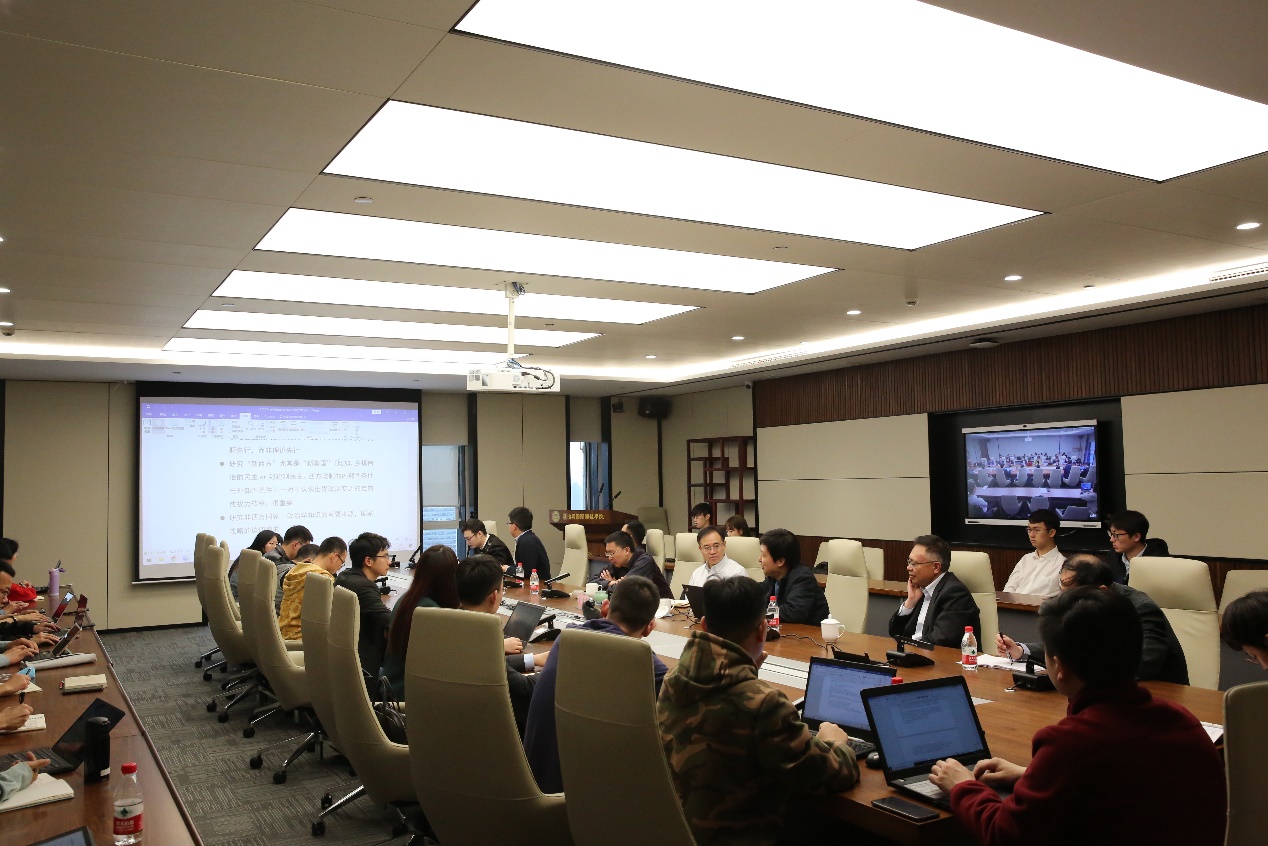
Thirdly, Professor Yang drilled down the future trends of China’s world politics studies through such cases as the Jakarta-Bandung High-Speed Railway. He suggested us bring back the tradition of world politics studies and upgrade related disciplines such as international relations and comparative politics. Talking about the specific ways, Professor Yang stressed we should base studies of world politics on studies by region and country, and putting issues rather than theories first; focus on the studies of the 'New West', especially the 'New America'; and apply the political science knowledge of non-Western countries to the studies of world politics.
In terms of discipline upgrading, Professor Yang suggested us to promote the development of world politics on the basis of retrieving the tradition, break the silo in the studies of world politics, and focus on the nature, function and effect of political thought in different research units such as technology, capital (economy and trade), and thought. In this way, we can build the world politics into a discipline studying the domestic institutional changes induced by political thought, and then helping shape the major country relations and the world order. By exploring a new view of history after the rise of China, we can upgrade the discipline of world politics into a new historical science.
Finally, Professor Yang discussed the practical significance of the transformation and upgrading of world politics from the perspective of reshaping the view of world order. On the basis of a brief definition, he told us that there is a kind of 'original sin' in the view of world order, which emphasizes the difference between universality and particularity in world view, between civilization and non-civilization in values, and between the right and the wrong in morality, under which China is put in a relatively disadvantageous position.
As Professor Yang explained, the emergence of this view of the world order with an 'original sin' touch was due to the fact that China has lagged behind the West for a long time in modern times, and the relationship between China and the world in history was mainly reflected in the East Asian order based on the Confucian civilization, mirroring the self-confidence of the Chinese nation. When it comes to reshaping and transforming the view of world order, Professor Yang indicated that the outside world is an important rather than decisive factor affecting China’s view of the world order, because ultimately China itself will play a crucial role.
Professor Yang’s insights into the past, present and future of world politics studies aroused strong interest among teachers and students. In the Q&A session,Professor Yang who has profound scholarship and theoretical accomplishment gave inspirational answers to a number of questions: Are Chinese researchers turning to the US paradigms or exploring a development path with Chinese characteristics during their international studies, Is the China-US strategic competition rooted in the differences of ideas or differences of interests, How does technology affect power competition and interest differentiation.
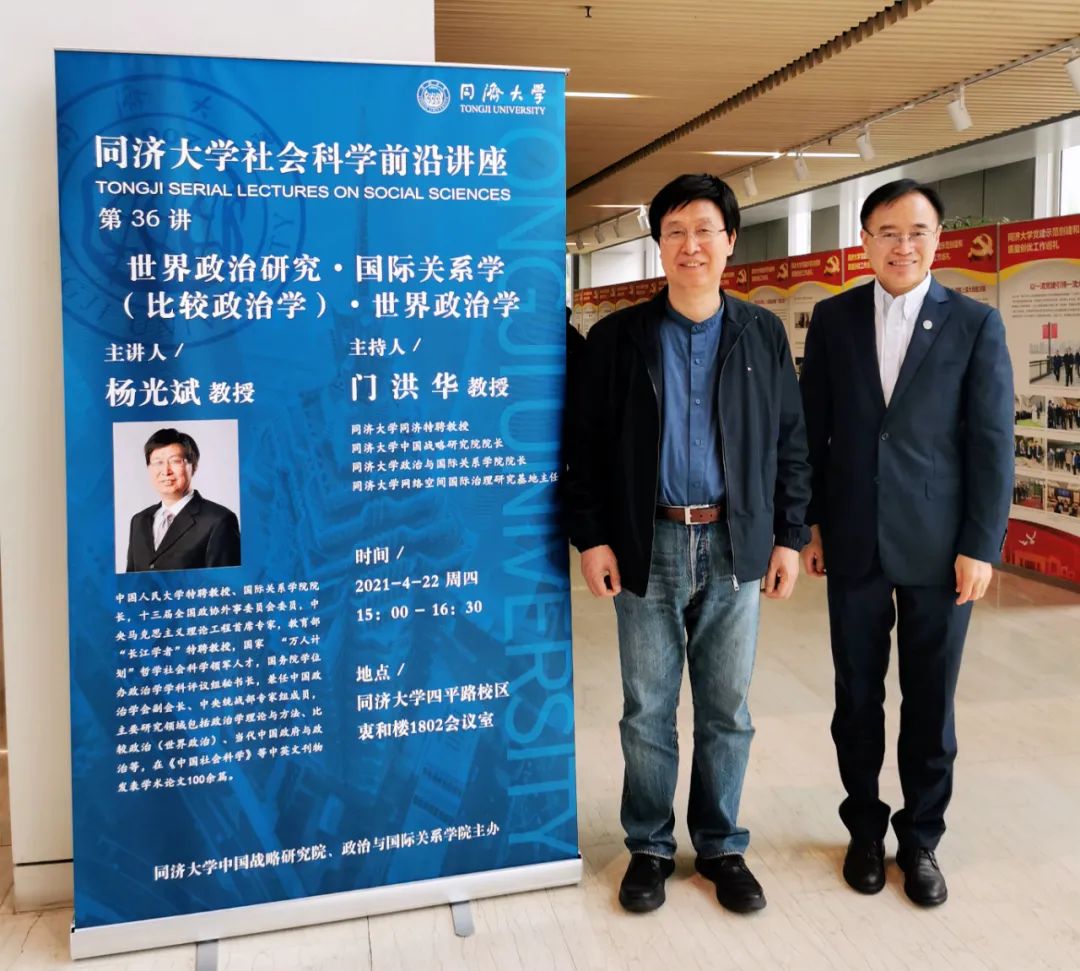
Professor Men expressed his gratitude to Professor Yang for the wonderful lecture. He commented that Professor Yang began his lecture from an introduction about the tradition of world politics of the CPC, followed by a detailed review of the historical development of world politics studies, providing a new starting point for world politics studies; with the increasingly frequent and close interaction between China and the international community, China’s world politics studies are about to usher in a rejuvenation. With an adherence to the approach of comparison between China and the West, Professor Yang has perfectly combined comparative politics with international relations, endowing this lecture with both penetrating thought power and great historical value, and reflecting the sense of mission and responsibility of a scholar. For the teachers and students present, this lecture was not merely a feast of political science, but a gift that inspires knowledge, ideas, and the future.




